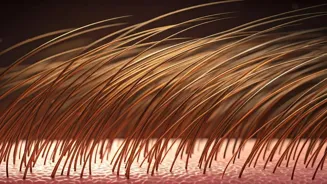What Is Dandruff?
Dandruff, a condition characterized by flaky skin on the scalp, is frequently a source of irritation and concern. While not generally regarded as a serious
medical problem, it is a persistent nuisance for many individuals, regardless of gender. The underlying causes are varied, however, the most common is thought to be a type of yeast called Malassezia globosa, which naturally occurs on the scalp. Other contributors might include dry skin, sensitivity to hair care products, and skin conditions such as seborrheic dermatitis or eczema. Recognizing dandruff's origins is the first step in managing and mitigating its impact on the scalp’s health and aesthetics.
Debunking Dandruff Myths
There are several widespread misconceptions about dandruff that cloud people's understanding of this common scalp condition. One prevalent myth is that dandruff is merely a sign of dry skin, which is not always accurate. While dry skin can cause flakiness, dandruff is often related to other factors. Another common misconception is that dandruff always causes hair loss. In many cases, the presence of dandruff itself does not directly result in permanent hair loss; however, severe dandruff can cause scalp inflammation, which may contribute to hair fall. Furthermore, it is often believed that only men experience dandruff, a myth that fails to acknowledge that both men and women can be affected. Understanding these facts is crucial for separating truth from fiction and effectively tackling dandruff.
Stress and Dandruff
The correlation between stress and dandruff is a significant factor in understanding scalp health. While stress does not directly cause dandruff, it can trigger or worsen the condition. Stress weakens the immune system and can lead to an imbalance in the scalp's natural environment. This imbalance may trigger the overgrowth of Malassezia globosa, which leads to dandruff. Moreover, stress can exacerbate existing skin conditions, such as seborrheic dermatitis, which commonly manifests as dandruff. To manage stress-induced dandruff, it's important to embrace stress-reducing techniques, such as exercise, meditation, and sufficient rest. Addressing stress helps minimize the impact on scalp health.
Dandruff and Hair Loss
The relationship between dandruff and hair loss is complex and a cause for concern. While dandruff does not directly cause permanent hair loss, severe cases and prolonged inflammation can affect hair follicles. The inflammatory response to severe dandruff can lead to scalp irritation, causing hair to shed. Furthermore, constant scratching to relieve itchiness can also contribute to hair breakage and shedding. In addition, dandruff can often be a symptom of other scalp conditions, such as seborrheic dermatitis, which may be associated with hair loss. If dandruff is accompanied by excessive hair fall, it's important to seek professional medical advice to determine the underlying cause and start appropriate treatment.
Treating Dandruff Effectively
Effective dandruff treatment depends on understanding its root causes and severity. Over-the-counter anti-dandruff shampoos containing ingredients like selenium sulfide, ketoconazole, or zinc pyrithione are often effective for mild to moderate cases. These ingredients work by inhibiting the growth of the fungus Malassezia globosa or reducing scalp inflammation. For more severe dandruff, prescription-strength shampoos or medications might be necessary. Maintaining a regular hair care routine, including gentle shampooing and avoiding harsh products, is crucial. Additionally, managing stress, eating a healthy diet, and getting enough sleep can help improve scalp health. Consistency and a holistic approach are key to keeping dandruff under control and maintaining healthy hair.













